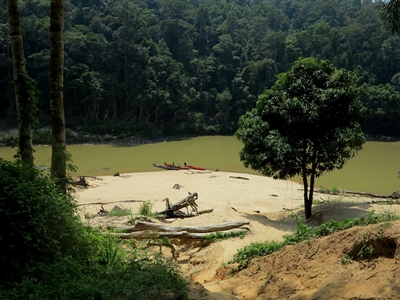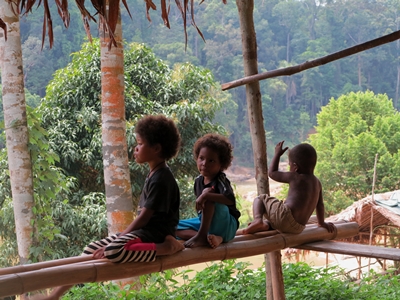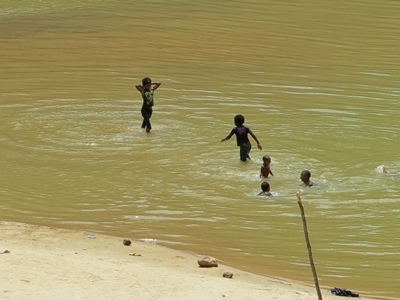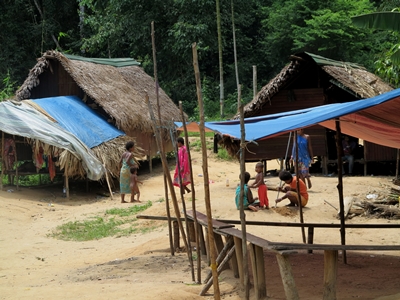Upon entering the Taman Negara reservation, I was assigned a local guide – a small, thin, and very polite young man named Danny. He was a great admirer of the traditions and way of life of the indigenous people. He sometimes went hunting with them in the jungle, with nothing but a spear and a bow, and slept in the trees at night, just like they did.
Orang Asli meant native people in the Malay language. These were hunter-gatherer tribes from the rainforest of continental Malaysia. Some of them lived far deep into the wilderness and had no contact with civilization, while others were organized in semi-nomadic communities, moving from one place to another every few months in search of food. It was such a community that Danny found for me, consisting of several families for whom he acted as interpreter and intermediary.
To reach our destination, we were to walk through the jungle for about an hour, and then continue by boat. The first part of the trip proved exhausting because of the dense vegetation and the excessive humidity, which made the stagnant hot air almost unbearable. When we came out of the forest by the river, my face was burning as if I had come out of a sauna. Getting on the boat was more than welcome.

A few thatched roofs in a clearing signaled that I was getting close to the village. Several children were bathing in the river, splashing water and laughing unceasingly. I disembarked and followed my guide on a steep path up to a shelter made of banana leaves, where I was invited to sit down.
I looked around me. The village had no more than four or five huts in total. Danny explained that it took about a day to build one, and the whole community participated. No wonder they could move the entire village every few months! The huts were built above the ground on wooden poles, and their walls were made of planks or plaited straw. I noticed that some of them had plastic foils over the roof. Obviously, those people had, for generations, relied on materials that they could find in their environment – now, plastic was one of them, as it had made its way right to the heart of the jungle.
Malaysia was a heterogeneous blend of Asian influences. Along with the dominant Malay population, the Chinese had prospered there since ancient times, thanks to the trade routes in the region, and many Indians settled there during British rule. Unlike any of those, my hosts had dark skin and curly black hair. They descended from the first inhabitants of the peninsula, who came from Africa by sea.

I was greeted by a young couple with two little boys and a daughter of about nine. As soon as they saw me, they hurried to put on some clothes that Danny had brought them. Obviously, they had been well instructed. Then, the man showed me how his people made fire with dry grass, and how they sent arrows impregnated with poison through a two-meter-long pipe.
“But what is it for? What do they hunt?” I asked the guide.
I learned that the main purpose was to hunt monkeys.
“What? They eat monkey?” I startled, surprised.
“Oh, yes!” Danny replied, and the look on his face seemed to suggest that he tasted it too, and that he liked it.
If anybody from the tribe managed to kill a monkey, they would all eat it together, or so I was told. Otherwise, they would stick to what they might find in the woods: fruits, mushrooms, roots. When they stayed longer in one place, they sometimes grew bananas or vegetables.
While we were talking, Danny pointed to one of the tribesmen, who had just come out of his hut. He soon vanished into the woods.
“See? He was hungry and went looking for something to eat.”
Given those people’s living conditions, as well as the very hot temperatures throughout the year, it was impractical to store any food. Every meal had to be obtained straight from the jungle, whenever a starving stomach was asking for it.
Sometimes, the Orang Asli would make contact with civilization, and some even worked in the cities. Danny told me a funny story about an acquaintance of his who had hired such hunter-gatherers for a temporary job. The first day, they came, worked, and got paid. They were supposed to come the next day, but instead, they disappeared without a word. They returned after two weeks, innocent as ever, acting like nothing happened. When they were scolded for their absence, they could not understand the reason. Most likely, they didn’t even understand that their time off had been “too long” relative to what was expected of them.
I imagined that, from their perspective, working in the city was not much different to getting food from the jungle: you only get what you need, when you need it. Based on that logic, working several days in a row to accumulate resources for the future made as little sense as continuing the hunt after catching the game. Since the food could not be preserved, the concept of supply and the very anticipation of needs were rendered useless. Those people seemed to only live in the present.

This was something worthy of Danny’s admiration.
“We, modern people,” he stated confidently, “have no idea what life is about. We always worry about tomorrow, wasting our time with all sorts of calculations. We make plans and scenarios, and life passes us by. The Orang Asli are wiser. After all, only the present is real; the rest is just in our heads…”
If ancient humans where no different than the Orang Asli when they lived as hunter-gatherers, then – who knows? – perhaps their way of life changed, among other things, because their perception of time evolved. After all, the more complex the representation of time, from present to past and future, the broader the individual’s expectations, projections, and ways to interpret reality. As time grows in people’s minds, people also live more in their minds, more isolated from their peers and from the environment, and thus, more unhappy…
Aside from the time spent searching for food, the Orang Asli had little to do. They just lazed around or slept, waiting for the heat to subside, or swam in the river to cool off, like the children were doing all day long. Few events seemed capable of disturbing the peace of their lives.

One such event was the death of someone in the village. In this case, my guide explained, the body was taken deep into the forest and left to rot in a wooden box suspended high in the trees, to be protected from animals. After two weeks, the family recovered the bones and buried them in a clay pot. The death of a member caused the entire community to move to a new location, although relocation occurred much more often for food-related reasons.
Another disturbing phenomenon was lightning. If lightning struck the village, it was a cause of great fear. In such a situation, the oldest man of the tribe, who acted as a shaman, had to sting his finger and let blood drip all around the village. Lightning was perceived as a supernatural force, a kind of god, which had to be appeased with a symbolic sacrifice. Unsurprisingly, it was a form of animism, the earliest type of religious belief.
I was asking a lot of questions, fascinated. I confessed to my guide that instead of a simple visit, I would have subscribed to a full research program just to be able to learn more about the Orang Asli. My hosts immediately informed me that I was not the only foreigner interested in their habits who had passed by.
“Oh, let us tell you about Alice!”
Alice was an English woman, blonde and white-skinned like me, Danny explained. She stayed in the village for a whole year, and she even wrote a book about it.
“She lived here with us, ate our food, slept in our huts,” one of the young Orang Asli confirmed.
For a moment, I tried to imagine what it would be like to eat raw mushrooms and monkey meat for a year, sleep on rough mats together with an entire family, and be washed only by the muddy river water or by the rain… I would have liked to learn more about the Orang Asli, but I wouldn’t have gone so far as to try to become one of them. I was not convinced that the mere regression to a supposedly idyllic moment in the evolution of our species could solve the problems of modern humanity – not more than we could go back in time and modify the past to improve the present.
There was another, much more practical reason why I would have hesitated to share one of those families’ huts, unlike the brave Alice. Ever since I arrived, I had noticed on the skin of my hosts some strange white spots covered with pustules. The guide told me it was a skin condition. A genetic one, he claimed, but he was unable to remember how it was called in English, no matter how hard he tried. He assured me it wasn’t contagious, but my instincts kept me from touching anything in the village. I still don’t entirely know what it was. Later, as I was trying to find out, I realized that many indigenous tribes in Malaysia were ravaged by diseases long eradicated in the rest of the world, such as leprosy…
Certainly, life in the jungle was anything but safe or comfortable. I knew I had to be cautious, but at the same time, I stubbornly refused to be intimidated…